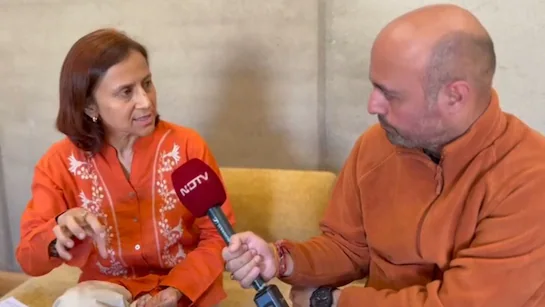
Punchline: On September 28, 2025, Gitanjali J. Angmo, wife of activist Sonam Wangchuk, said her husband’s arrest is part of a “witch hunt” that began four years ago, raising concerns about freedom of speech in India.
Sonam Wangchuk, a respected environmentalist, educator, and activist from Ladakh, was arrested recently, sparking widespread concern and discussion across India. His wife, Gitanjali J. Angmo, stated that this arrest is part of a long-standing “witch hunt” against him because of his advocacy for Ladakh’s statehood and environmental protection.
Angmo explained that intelligence agencies had visited their home multiple times over the years, warning them about their NGO’s foreign funding and threatening to stop their work. She also said that their land lease for the Himalayan Institute of Alternatives Ladakh (HIAL) was cancelled as a form of political retaliation.
Wangchuk has been known for peaceful protests and campaigns to highlight Ladakh’s issues, including environmental conservation, education reform, and regional autonomy. His work has inspired people across India and earned him respect internationally. Gitanjali J. Angmo believes his arrest is politically timed, possibly due to the growing support for Ladakh’s statehood.
The arrest has led to protests in Ladakh and other parts of India, with activists, students, and human rights organizations expressing strong concern. Many view this arrest as an attack on democracy and freedom of speech. Political leaders have demanded his immediate release and called for a transparent investigation.
This case highlights the importance of protecting the rights of activists in India. It raises crucial questions about how to balance government security measures with civil liberties. For many, Sonam Wangchuk’s arrest is not just about one individual but about safeguarding democratic rights and peaceful protest for the future of India.
Conclusion: Gitanjali J. Angmo
The arrest of Sonam Wangchuk has not only sparked protests but also ignited a deeper conversation about freedom of speech, the role of activism, and the rights of citizens in India. It serves as a reminder that protecting democratic freedoms is crucial, especially when it comes to peaceful protest and advocacy.
The case of Wangchuk highlights the delicate balance between national security and civil liberties, and the need for transparent processes to ensure justice. This incident could shape the future of activism in India, influencing how dissent and public movements are treated going forward.
FOR MORE BLOGS – beyondthepunchlines.com

 Add to favorites
Add to favorites








